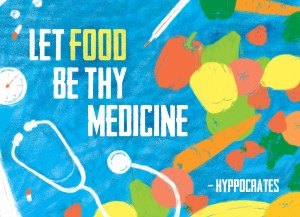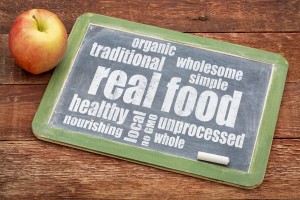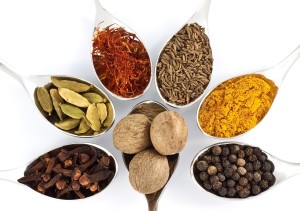Food as Medicine
by: Dr. Anne Zauderer
The title for this article comes from a quote from one of the most historically famous physicians, Hippocrates. He said, “Let food be thy medicine and medicine be thy food.” Though he said this quote thousands of years ago, it has become even more relevant to us in our modern world. Consuming the modern diet, we have seen a surge in digestive-related conditions. Not only that,  modern science is now connecting a lot of seemingly unrelated chronic diseases to the gut as well. Hippocrates knew this well because he also said that “All diseases begin in the gut.”
modern science is now connecting a lot of seemingly unrelated chronic diseases to the gut as well. Hippocrates knew this well because he also said that “All diseases begin in the gut.”
One thing that is difficult about the world we live in is the fact that we have lost touch with the whole process of eating. We don’t grow our own food, we don’t harvest it, and in a lot of cases we don’t even prepare it. In short, we don’t have to even think about the process behind food. This is advantageous as a society because it has allowed us to expand our thinking and make huge advancements in technology. However, this “lack of thought” when it comes to food has set the stage for us to eat whatever is put before us, without much thought as to the impact it has on our bodies.
At the same time that we have become disconnected with the food we eat, the food industry has flourished. The food industry is a business. This means that they are out to make a profit. They are not looking out for your health concerns. They are out to develop products as cheaply as possible while making you want to consume as much of their product as they can. This can make the whole process of eating very confusing. What should we eat? What is healthy for us? What is actually food?!
Whole Foods
Most people might be surprised to know that the majority of the foods they eat on a daily basis are not, in fact, really food. What I mean by this is, if you looked in nature, you could not find a lot of the food substances we eat. The average American eats less than 35% of his or her diet from whole foods daily.
Whole Food: a food that has not been altered or processed.
 For example, an apple is a whole food, applesauce is not. To make applesauce, you have to peel the apple, cook the apple, blend the sauce, and add sugar. You have taken a whole food (the apple) and altered it in a way that decreases its nutritional value. I’m not saying that eating applesauce is a bad thing, but it’s not a whole food.
For example, an apple is a whole food, applesauce is not. To make applesauce, you have to peel the apple, cook the apple, blend the sauce, and add sugar. You have taken a whole food (the apple) and altered it in a way that decreases its nutritional value. I’m not saying that eating applesauce is a bad thing, but it’s not a whole food.
One simple way to ensure that you get the maximum amount of whole foods is to shop the perimeter of the grocery store. Stay with the fresh produce, meat and seafood and don’t get sucked into the inner aisles where they keep all of the packaged, preserved food-like substances.
In order to retain the maximum amount of nutrients when cooking your food, just lightly steam or sauté your vegetables and add good fats such as coconut oil and olive oil.
Color
A very simple way to determine the nutritional value of the foods you are eating is to look at the color of them. Foods that have deep, rich colors have more nutritional value. In nature, it’s the phytonutrients in the plant that give them their color, as well as serve as protection for the plants from the UV rays of the sun. These phytonutrients have the same antioxidant and protective effects in our bodies.
Some of the best “super foods” are our most colorful foods and very high in phytonutrients:
- Kale
- Spinach
- Brussel sprouts
- Broccoli
- Beets
- Red bell peppers
- Sweet potatoes
- Blueberries
- Raspberries
- Plums
Quality
When it comes to food, quality does matter. Choosing organic foods is better for your body and the environment.
Scientists have now genetically modified foods to be resistant to certain pesticides and herbicides. One class of these foods is known as “Roundup Ready” crops. These are a particular strain of seeds that grow crops that are resistant to a particular herbicide called glyphosate, known by the commercial name Roundup. The genetic modification of these plants makes them resistant to the herbicide so that farmers can spray it all over the plants and only kill the weeds. This allows farmers to produce more crops; however, the price we pay is our consumption of more of this chemical. The top crops that are currently listed as “Roundup Ready” are: soy, corn, canola, alfalfa, cotton, sorghum, and wheat. I don’t think it is a coincidence that these are becoming some of the most common food allergens that people experience.
The British Journal of Nutrition also recently published a review of the literature showing that organic foods have higher antioxidant levels. So choosing organic foods not only limits your intake of harmful pesticides, but it also increases the nutritional value of the foods that you eat.
Spice it Up
 Cooking with spices is one of the easiest ways to improve the nutritional content of your food … while making it taste better! There are so many herbs that have anti-inflammatory properties to them, and cooking with them adds an extra nutritional “punch” to your meal. Turmeric is one of the most potent anti-carcinogenic and anti-inflammatory herbs out there. Dill can help remove e. coli from the gut. Basil can help improve serotonin and dopamine levels, naturally. These are just a few examples of how we can use herbs medicinally to support the body.
Cooking with spices is one of the easiest ways to improve the nutritional content of your food … while making it taste better! There are so many herbs that have anti-inflammatory properties to them, and cooking with them adds an extra nutritional “punch” to your meal. Turmeric is one of the most potent anti-carcinogenic and anti-inflammatory herbs out there. Dill can help remove e. coli from the gut. Basil can help improve serotonin and dopamine levels, naturally. These are just a few examples of how we can use herbs medicinally to support the body.
Herbs can also be used as an infusion for tea. Some of the best digestive herbs are ginger root, peppermint, and chamomile.
Recipe for digestive tea: ¼ tsp of each: coriander seed, cumin seed, and fennel seed. Steep in boiling water for about 5-10 minutes and enjoy. Will help reduce bloating and improve digestion.
Don’t be Afraid of Fats
Americans have a fat phobia. We are afraid that if we eat fats, we will get fat. This could not be farther from the truth. Where we go wrong is that we don’t eat the right type of fat. We need to focus on increasing our intake of the good fats and decreasing our intake of poor quality, processed fats.
Some good examples of fats to add to your diet are:
- Avocado
- Coconut oil
- MCT oil (medium chain triglyceride oil, found in coconut oil)
- Olive oil (only to drizzle, not to cook with)
- Nuts and seeds
Food can be a really powerful tool to heal your body. It takes time, education, and discipline to really choose to make a difference in your diet and lifestyle. I have yet to meet someone who doesn’t feel better after improving the quality of their diet. Below are 5 steps you could take today. Pick one and start working on it in the new year!
1. Get rid of sugar – pay special attention to hidden sugars in yogurt, bread, drinks, cereal, breakfast bars
2. Significantly reduce additives and preservatives – Don’t buy anything in a box, choose organic
3. Increase good fats and proteins from organic and grass fed sources
4. Decrease simple carbohydrates – Wheat, pasta, crackers, sugar
5. Drink more water





